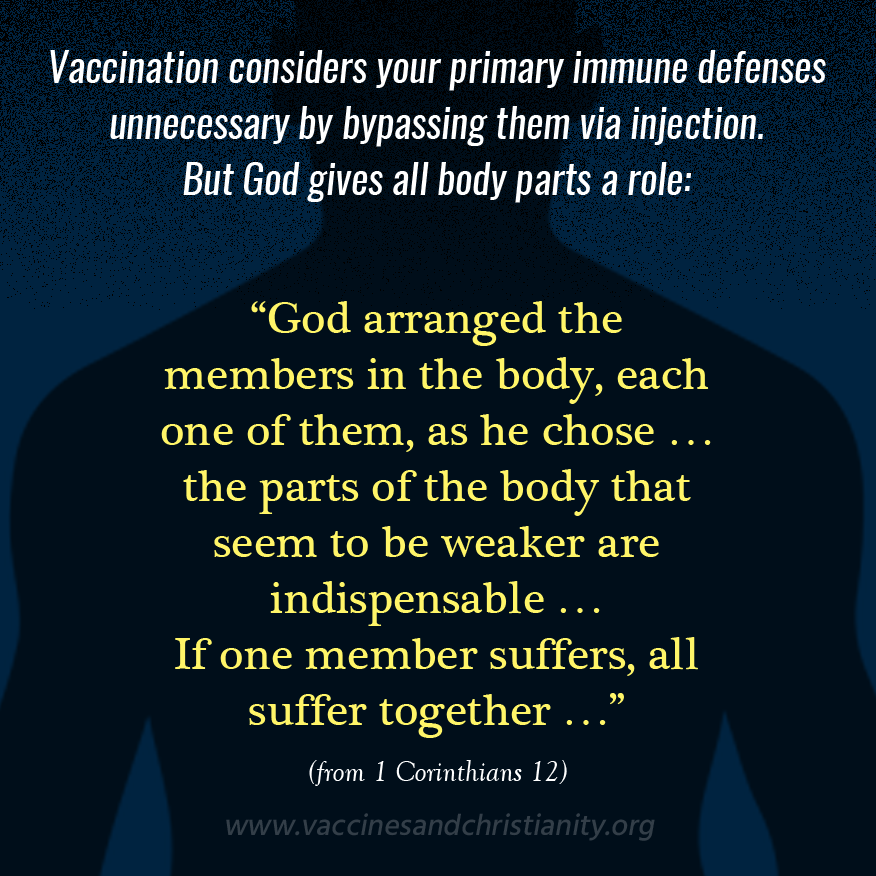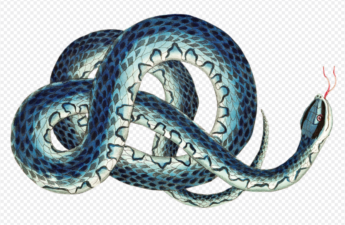
by Stephen Halbrook
other posts in this series
God made everything for a purpose. We know this because He is all-wise. In light of this, let’s discuss 1 Corinthians 12 and its implications for vaccination.
1 Corinthians 12:12-27 makes an analogy between the physical body and the body of Christ to say that all of those in the church are interdependent of one another and everyone plays a crucial role. This is based on the fact that all parts of the physical body are interdependent and each part likewise plays a crucial role. Much of the text under discussion reads:
For the body does not consist of one member but of many. If the foot should say, “Because I am not a hand, I do not belong to the body,” that would not make it any less a part of the body. And if the ear should say, “Because I am not an eye, I do not belong to the body,” that would not make it any less a part of the body. If the whole body were an eye, where would be the sense of hearing? If the whole body were an ear, where would be the sense of smell? But as it is, God arranged the members in the body, each one of them, as he chose. If all were a single member, where would the body be? As it is, there are many parts, yet one body.
The eye cannot say to the hand, “I have no need of you,” nor again the head to the feet, “I have no need of you.” On the contrary, the parts of the body that seem to be weaker are indispensable, and on those parts of the body that we think less honorable we bestow the greater honor, and our unpresentable parts are treated with greater modesty, which our more presentable parts do not require. But God has so composed the body, giving greater honor to the part that lacked it, that there may be no division in the body, but that the members may have the same care for one another. If one member suffers, all suffer together; if one member is honored, all rejoice together. (1 Corinthians 12:14-26, ESV)
Bible commentator Matthew Poole writes,
The infinitely wise God, who hath made the body of man, and ordered all the members of the body for several uses and offices, either for the upholding or accommodating the life of man, hath likewise appointed the order in the body in which every member shall stand; that the head should be uppermost for the better guidance of the whole body; the feet lowermost to tread upon the earth, and to bear the weight of the whole body: and none must repine at the wisdom of God, which hath not only created man’s body, (consisting of a variety of members), but also appointed every member its place, and there setteth it, that it cannot shift its station or office.
Matthew Poole’s Commentary, “1 Corinthians 12” (Bible Hub, Text Courtesy of BibleSupport.com). Retrieved August 9, 2024, from https://biblehub.com/commentaries/poole/1_corinthians/12.htm
And so we see according to God’s word, all parts of our physical body have a role to play. None can be dismissed as “unnecessary” — as excerpts from the text read, “God arranged the members in the body, each one of them, as he chose … the parts of the body that seem to be weaker are indispensable … If one member suffers, all suffer together …” Regarding one’s health, the necessity of body parts is especially crucial regarding internal organs (which are relevant to this discussion), given their role in proper functioning bodily processes.
But tell this to “modern medicine” – much of which is not built on the rock of God’s wisdom, but on the sand of man’s imagination. This worldview has a trend of denying the vital role certain body parts and processes play – despite being created by God Himself.
Just so we are not misunderstood, we are not denying the need to part with certain body parts in certain urgent situations. But this does not assume that such body parts are unnecessary: if anything, life without that part will become harder. For instance, if a limb is severed because of gangrene, daily activities will become more difficult and less productive.
By extension, if an organ is removed in an emergency procedure, internal processes will become more difficult and less productive. As the eye and the hand work hand-in-hand, so does one organ with another. Indeed, in the matter of removing internal organs, your body’s internal processes will be forever negatively altered, causing health problems to various degrees.
However, flippantly advising one to lop off a body part or excise an organ as if there are no, or minimal consequences, is another thing entirely – not to mention hazards from surgery (which are typically downplayed), and disregarding natural, safe alternatives (via nutrition, lifestyle, etc.) that can fix the problem.
We will deal with how vaccination applies to this matter momentarily. First, a few examples of body parts that have wrongly been considered more or less useless.
(I will not say that there are absolutely no cases where removal of any of the below is warranted; only that if you are ever faced with such, it is important to get informed consent, do your research, and, based on the consequences for removal, count the cost. For instance, if you think your appendix is on the verge of bursting, you may judge via a cost-benefits analysis that, to save your life, removal of it is needed — despite the health problems and even dangers that can result from it. Of course, remember that money is a driving factor for organ-removal operations, and there is the problem of misdiagnoses.)
Appendix and Tonsils
The appendix and tonsils – which have been defamed as being worthless by those who deny God’s wisdom in creating the body – actually serve an important role in the immune system.
The appendix plays a key role in gut health:
[T]he appendix is kind of helping us in two ways, both within the gut: It’s helping to fight off invading pathogens, but also to repopulate the gut with this beneficial bacteria after gastrointestinal issues.
Interview with Heather Smith in Selena Simmons-Duffin, “Your appendix is not, in fact, useless. This anatomy professor explains” (npr, February 2, 2024). Retrieved August 7, 2024, from https://www.npr.org/sections/health-shots/2024/02/02/1228474984/appendix-function-appendicitis-gut-health
Likewise, tonsils are an important means of protection from foreign matter:
Like the appendix, they were once believed to be useless, but our tonsils actually play a key role in defending the body from germs and bacteria. … Located near the respiratory system and digestive tract, the tonsils are crucial in preventing pathogens from entering the body and causing infection or disease. By binding to these pathogens, the tonsils trigger an immune system response.
Carolina Ear Nose & Throat, “7 Amazing Facts About Your Tonsils” (July 7, 2019). Retrieved March 12, 2024, from https://carolinaearnosethroat.com/7-amazing-facts-about-your-tonsils
According to a study, removal of the appendix or tonsils can result in heart attacks:
Surgical removal of the tonsils or appendix in young people is associated with an increased relative risk of early heart attack, according to a novel study by researchers at Karolinska Institutet.
Karolinska Institutet, “Increased risk of heart attack after early removal of appendix or tonsils” (July 6, 2011). Retrieved August 7, 2024, from https://news.ki.se/increased-risk-of-heart-attack-after-early-removal-of-appendix-or-tonsils
Regarding alternatives to tonsil removal, Dave Mihalovic writes,
“Chronic swelling of tonsils is best addressed by reducing sugar intake, adopting a minimally processed diet that is rich in fresh plant foods, and supporting immune system health by getting plenty of rest, exercise, and exposure to sunlight and fresh air.”
Adenoids
The adenoids have been denigrated as being more or less useless – at least when you are no longer a child. And yet, like the appendix and tonsils, it serves a role in the immune system:
Like the tonsils, the adenoids are one of the most important parts of your immune system because they are located near the entrance of your breathing passages, and they serve as a first line of defense against undesirable airborne microorganisms and substances. …
The importance of adenoids lies in its ability to physically restrict the nasopharyngeal space, rendering a decrease in nasal passage expansion which is a good thing to for disease prevention. Adenoids also contain cells that make antibodies to help your body fight infections.
Dave Mihalovic, “6 Body Parts Doctors Think Are Useless: How Little Do They Know” (whale.to). Retrieved August 8, 2024, from http://whale.to/c/6_body_parts.html
Predictably, there appear to be long term consequences to their removal. According to a study (which also discusses tonsils):
In this population-based cohort study of almost 1.2 million children, removal of adenoids or tonsils in childhood was associated with significantly increased relative risk of later respiratory, allergic, and infectious diseases. Increases in long-term absolute disease risks were considerably larger than changes in risk for the disorders these surgeries aim to treat.
Byars SG, Stearns SC, Boomsma JJ. Association of Long-Term Risk of Respiratory, Allergic, and Infectious Diseases With Removal of Adenoids and Tonsils in Childhood. JAMA Otolaryngol Head Neck Surg. 2018;144(7):594–603. doi:10.1001/jamaoto.2018.0614
Gallbladder
Finally, the “infamous” gallbladder.
The gallbladder serves an important digestive function. It is required to emulsify fats. The gallbladder stores bile and bile acids, which emulsify the fat one eats so it can be properly transported through the intestine into the blood stream.
Dave Mihalovic, “6 Body Parts Doctors Think Are Useless: How Little Do They Know” (whale.to). Retrieved August 7, 2024, from http://whale.to/c/6_body_parts.html
If bile duct injury from the surgery doesn’t kill you, there are other consequences. The body can no longer function properly.
Anyone who has their gallbladder removed needs to take some form of bile salts with every meal for the rest of their life, if they wish to prevent a good percentage of the good fats they eat from being flushed down the toilet. Since most people who remove their gall bladder ignore this advice, this is exactly what happens and they have little absorption of good fats. If one does not have enough fats in the diet, their entire physiology will be disrupted, especially the ability to make hormones and prostaglandins.
Dave Mihalovic, “6 Body Parts Doctors Think Are Useless: How Little Do They Know” (whale.to). Retrieved August 7, 2024, from http://whale.to/c/6_body_parts.html
Thus, we find these consequences:
[S]ome people experience persistent issues known as post-cholecystectomy syndrome.
Long-term effects of gallbladder removal include diarrhea, fatty food intolerance, gas, heartburn, nausea, vomiting, jaundice, and intermittent episodes of abdominal pain. Symptoms of post-cholecystectomy syndrome typically begin in the postoperative period, but can also begin months or years after surgery.
Sherry Christiansen, Long-Term Effects of Gallbladder Removal (verywellhealth, Updated on December 11, 2023). Retrieved August 7, 2024, from https://www.verywellhealth.com/gallbladder-surgery-long-term-care-5024905
As well as cancer, per one study:
The incidence of cancer in the cholecystectomy group was 9.56 per 1,000 person-years and that in the control group was 7.95 per 1,000 person-years. Patients who underwent cholecystectomy showed an increased risk of total cancer (adjusted HR, 1.19; 95% CI, 1.15 to 1.24; p<0.001), particularly leukemia and malignancies of the colon, liver, pancreas, biliary tract, thyroid, pharynx, and oral cavity. In the subgroup analysis according to sex, the risk of developing cancers in the pancreas, biliary tract, thyroid, lungs and stomach was higher in men than in women.
Choi YJ, Jin EH, Lim JH, Shin CM, Kim N, Han K, Lee DH. Increased Risk of Cancer after Cholecystectomy: A Nationwide Cohort Study in Korea including 123,295 Patients. Gut Liver. 2022 May 15;16(3):465-473. doi: 10.5009/gnl210009. PMID: 35502586; PMCID: PMC9099388.
Regarding alternatives to gallbladder removal, Dave Mihalovic writes,
“Instead of removing your gallbladder, lifestyle changes including changing dietary habits and exercise will prevent any non-life threatening problems that exist with your gallbladder, especially stones.”
Dave Mihalovic, “6 Body Parts Doctors Think Are Useless: How Little Do They Know” (whale.to). Retrieved August 8, 2024, from http://whale.to/c/6_body_parts.html
Seeing the impact on the body in this sampling of body parts considered more or less useless, we are reminded of the previously cited Scripture text, “If one member suffers, all suffer together …” Removal of body parts negatively impacts the whole body, as the effect is beyond the individual part that is removed. This is especially so regarding body parts relating to the body’s internal processes.
This sampling shows the absurdity and danger of the worldview that denies the value in every body part. A worldview that, in denying divine wisdom, is, practically speaking, atheistic – as if man does not need God.
If this worldview is assumed in vaccination, can we not likewise expect serious consequences as well? And in fact, such a worldview vaccination has.
In vaccination, your primary immune defense – composed of the skin (which externally protects the bloodstream) the gut (which internally filters and detoxifies foreign substances to protect the bloodstream), and other important defenses — tonsils, adenoids, etc. – are considered “unnecessary” because it is bypassed via injection.
In essence, vaccination says to your most vital immunological defenses, “I have no need of you” — despite their critical role in a proper immunological response and in filtering poisons (such as vaccine ingredients). Practically speaking, when vaccination is performed, the organs and protections that it bypasses are removed, as their uses in that occasion are nullified.
Vaccination is analogous to attempting a better way to intake food by bypassing chewing and digestion and placing solid food right into the bloodstream. It is absurd.
As we have shown in the examples of the tonsils, appendix, adenoids, and gallbladder, when we treat body parts as unnecessary, then we reap what we sow – and thus vaccination has, contrary to pro-vaccine propaganda, not only failed to prevent disease, but has caused untold suffering and death.
What makes vaccination more absurd than the other examples is that they are at least a reaction to a perceived existing problem (even if, at least too often, ill-advised); they are not usually presented as the norm (that is, surgical removal of such organs is not advised for most people).
On the other hand, from day one of birth to the end of one’s life, vaccination is promoted to everyone – the healthy included — and thus presented as the norm. Vaccination thus assumes one’s most vital immunological defenses are inherently flawed and says of them throughout one’s entire life, “I have no need of you.”
The natural outcome: the body says, “I have no need of health.”
Instead of vaccinating, we need to say to God, “I have need of you” by trusting His divine wisdom in all matters of life – health included – and make daily healthy decisions in light of such wisdom.
Either that, or indulgence in the spiral of madness of denying God’s wisdom regarding every part of the human body. We have been engaged in blood poisoning via vaccination for centuries. We needlessly plunder the body of its internal organs. We once cut the brain via surgical lobotomies to “cure” “mental illness,” and now we cut off the genitals in order to “cure” one’s gender. With transhumanism in the works, don’t be surprised to find people lopping off body parts for cybernetic enhancements and other insane things for the sake of convenience in the name of scientific advancement. The sky’s the limit.
If you find this site helpful, please consider supporting our work.


